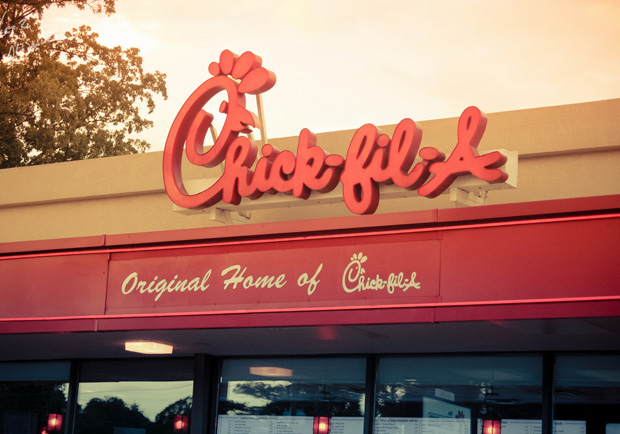In our polarized culture, potential enemies lurk around every ideological corner. Think of the back-and-forth in the comment section of blogs, our deeply entrenched political system that pits Democrats against Republicans, or the on-going mommy wars. Whenever we face someone who disagrees with our deeply held convictions, we tend to either passionately defend our vantage point or simply dismiss them.
Jesus offers a counterintuitive proposal; "You have heard the law of Moses say, 'Love your neighbors and hate your enemies.' But I say, 'Love your enemies.'" This mantra is often quoted, but rarely lived out. We say, "Love your enemies," but then go back to our bunker, maybe with a superficial smile, but without stopping to apply Jesus' words to our lives.
Dan Cathy, Chick-fil-A's chief operating officer, became the latest big-name example of someone who took this command seriously, initiating a conversation with and ultimately befriending a LGBT activist.
Last summer, a heated controversy erupted over Cathy's refusal to support gay marriage. As expected, many of us retreated to our pre-existing trenches. We declared whether or not we'd ever eat a Chick-fil-A sandwich again. We stood by the restaurant in appreciation or boycotted it in disgust. We did what we are too good at: opposing our enemies.
While we were busy fighting, Cathy slipped unnoticed into potentially hostile territory—but not for a counter-attack. Campus Pride director, gay activist, and openly gay man Shane Windmeyer, "came out" as Cathy's friend in an article he wrote for Huffington Post last month, describing how Cathy had reached out to hear more about LGBT concerns regarding his company.
In the midst of this unprecedented dialogue, Windmeyer writes, "Dan expressed a sincere interest in my life, wanting to get to know me on a personal level. He wanted to know about where I grew up, my faith, my family, even my husband, Tommy. In return, I learned about his wife and kids and gained an appreciation for his devout belief in Jesus Christ and his commitment to being 'a follower of Christ' more than a 'Christian.' Dan expressed regret and genuine sadness when he heard of people being treated unkindly in the name of Chick-fil-A, but he offered no apologies for his genuine beliefs about marriage."
Cathy's surprising approach gives us permission to question our default responses. Have we ever genuinely tried to love our enemies? What does Cathy understand that we might be missing? What made him stretch across the divide to initiate a friendship with a man who publicly criticized him and organized boycotts against his establishments?
The current cultural milieu seems to have hoodwinked us to believe the false premise that we must both agree with and bless our enemies' choices in order to love them. Christianity does not give us permission to dishonor or disregard those whom we perceive as enemies. It does not require us to come in lockstep with their perspectives as a prerequisite to sharing the love of Christ. Cathy seemed to get this.
Cathy "had to both hold to his beliefs and welcome me into them," said Windmeyer. "He had to face the issue of respecting my viewpoints and life while not being able to reconcile them with his belief system. He expanded his world without abandoning it. I did as well."
Though most of us won't have to navigate forays into enemy territory in such a public fashion, we still have many of the same obstacles to overcome. Windmeyer alluded to perhaps the greatest barrier when he wrote, "I have spent quite some time being angry at and deeply distrustful of Dan Cathy… He is the enemy, right?"
It's easy for us to label our enemies, to set them apart from ourselves so we can oppose or avoid them. We fear that if we become quiet long enough to listen, we might actually be permanently silenced and lose representation in culture and politics. We foresee our core ideologies being wrenched from our hands, and that terrifies us. After all, our identities are so closely linked to our beliefs that we fear we losing ourselves if the enemy has a valid point. Additionally, many of us carry the unrealistic expectation that if we fail to immediately convert our enemies to Jesus, we are somehow bad Christians. Our fear and shame then become additional barriers to reaching out in love.
When we can grasp the reality that others are worthy of our love simply because they are made in God's image—not because they agree with us— bridging ideological divides becomes possible. How might our lives look if instead of cutting off relationships, we chose to say, "I don't share your conviction on that topic, but I would like to hear more about why this is so important to you." If nothing else, listening well dials down defensiveness and allows for empathy, which moves us in the direction of love.
Though Windmeyer doesn't specifically articulate it in his article, his relationship with Cathy repeatedly points to an essential component of love, which Christ demonstrated for us: sacrifice. Jesus had the power to crush his enemies in the natural realm, but instead, he abdicated his power and went to the cross in the name of love. While clearly not as consequential as the Messiah's choice, both these men willingly put their reputations on the line in the hope of closing the gap between them. Might we do the same with our enemies? Maybe over waffle fries.
Dorothy Littell Greco divides her time between writing, making photographs, pastoring, and keeping three teenage sons adequately fed. She lives and works in the Boston area and is a reluctant Patriots/Celtics/Bruins/Red Sox fan. You can check out more of her words and images at dorothygreco.com.









